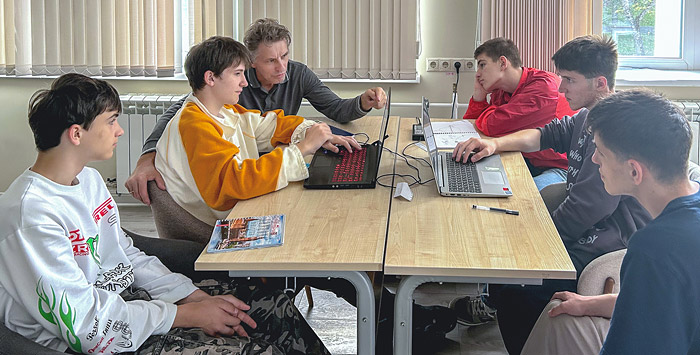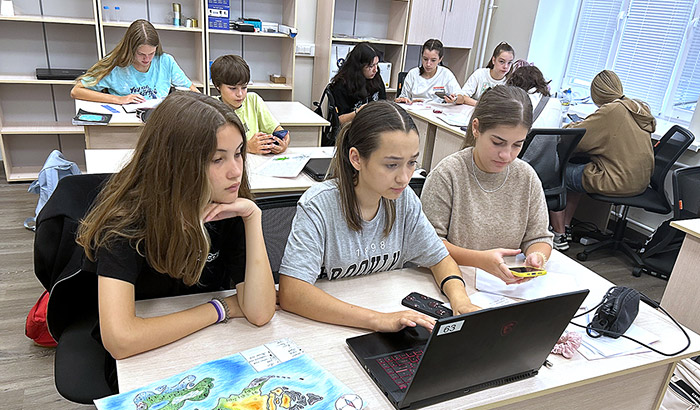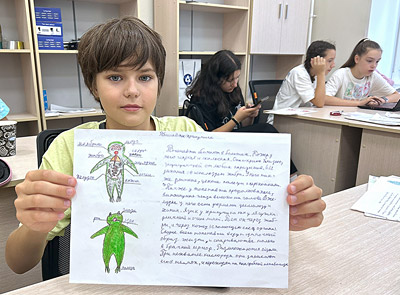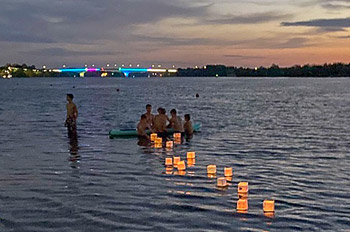
Electronic english version since 2022 |
The newspaper was founded in November 1957
| |
Youth and science
Knowledge transfer relay - a long tradition
From 26 July to 13 August, the 37th International Computer School and the 3rd Workshop "Teachers of the future" were held in Dubna. The projects were held with the financial and organizational support of JINR on the territory of the JINR University Centre, the Lyceum named after V. G. Kadyshevsky, the Universal Library named after D.I.Blokhintsev. 42 students took part in the Summer School, and 22 teachers took part in the Workshop.
This time, the School was held at several sites in the city: in the UC, the library, the Lyceum. The participants ate in the restaurant of the hotel "Dubna", the visiting delegations were accommodated in the JINR hostel and the residents of Dubna, Moscow and the Moscow region - in the city, at home and at their friends. In recent years, the School has been held on the territory of the dispensary "Ratmino" but due to the construction of a new building, the site was not suitable.
The permanent Scientific Leader of the International Computer School Petr Shirkov spoke about the organizational features and that due to the lack of a single platform, unfortunately, some of the joint classes were canceled: "This time, we lost the opportunity for all school participants to stay on the same territory for a full day. School is a kind of community where we teach children not only to explore the world around them, but also try to instill in them some norms of communication not only educational and scientific, but also social. This time, all joint events began at 7:30 AM at breakfast. And some of the children on a day stay fell out of this event because they stayed to have breakfast at home. Also, the general communing was forced to end at about 9:00 pm because many sites were closed. In "Ratmino" at 7:00 AM in the morning we already had a swim in Dubna and communicating with each other ended right before the end, at 10:30 PM. "

Petr Shirkov spoke about the methodology used in practice at the International Computer School: "When you do something yourself, the motivation increases greatly. The Chinese have a very good saying: "If you give a person a fish, he will be full for one day. If you teach him how to fish, he will always be full." The result of our technique is that children are able to explore the world around them and they can do it further on their own at a completely different level. Psychology shows that even a highly motivated listener from the material that a gifted lecturer tells him absorbs no more than 15-20 percent, the rest passes by because he is a passive participant in the process. We are trying to make our students active participants in the process. They independently make discoveries for themselves that humanity once made. But this is their personal scientific achievement. They create and thus can assign results to themselves."
Of the 42 participants, 22 students came to the School as part of delegations from JINR Information Centres from Kamchatka, Primorye, North Ossetia and Rostov-on-Don. The other 20 people are residents of Dubna, Moscow and the Moscow region. They were selected by correspondence competition. Most of all - 10 people turned out to be from the Lyceum named after V.G.Kadyshevsky, where two students claimed one place.

The students independently chose one of the five proposed projects to participate. This year, there were the following topics:
"Portable power plant". A situation was invented in which the expedition got into a hurricane on the river and lost some of the equipment. It is necessary to organize a more or less comfortable stay until the moment of salvation and provide yourself with cellular communication, if it appears.
"Space mission". On one of the planets of some star system, communication with a probe performing a reconnaissance mission disappeared. We need to send another probe to detect the lost. There is a problem of flying from the orbit of one planet to another.
 "Code Fomalgaud". A project to save fantastic krakozyabra, whose reservoirs were spoiled and each subspecies consumes water of its own quality composition. Earthlings try to help these subspecies by returning water of the desired quality.
"Code Fomalgaud". A project to save fantastic krakozyabra, whose reservoirs were spoiled and each subspecies consumes water of its own quality composition. Earthlings try to help these subspecies by returning water of the desired quality.
"Ballistics of sports projectiles". In game sports - football, basketball and volleyball, balls that bring victory to teams sometimes fly along very strange trajectories, you need to figure out why.
"House in the trunk". A project to build a house with its own functionality that could be placed in the trunk of a car.
The most popular were the first three projects of the above. The children drew up a work plan, carried out research step by step, made calculations and prepared a final report.
Before the start of the two-week School, a five-day Workshop "Teachers of the future" was held that considered the methodology of project training and completed the preparation of projects for the International Computer School (projects are thought out in advance, at the Workshop, they acquire the final features). It was attended by teachers that will then oversee projects. Among the students were those that came only to master the methodology, they did not stay on the School and maintaining projects. Also, a unique opportunity to be admitted to the teacher's Workshop was given to two high school students from Protvino that had just moved to the 11th grade.
Talking about the author's pedagogical methodology, Petr Shirkov states: "You need to immerse yourself in it and live, otherwise you will not be able to repeat it. Therefore, all our schools for project education are built in such a way that we immerse our teachers in the "skin" of students. They themselves should master the entire path that the students will then go under their supervision. And this technique shows very high efficiency of results, including those related to maintaining the motivation of children to study and this is one of the problems of today's school." The idea of a computer school is related to the fact that children are involved in engineering and research activities but globally the methodology of project education can be used in other areas of education.
Despite the fact that the Workshop was to be held five days, as a result, the teachers went through a longer school. After all, supervising the project, they also acquired practical experience that consolidates the theory obtained.
The Workshop "Teachers of the future" brought together teachers that are really not indifferent to science and their profession, striving to improve skills and to give children a quality education. Participation here is voluntary and it is not paid in any way. The main reward for everyone is the experience gained.
We asked some curators to share their impressions of the Workshop and the International Computer School.
Alexander Yanovsky, a Master at the Southern Federal University and a physics teacher at a comprehensive school in Rostov-on-Don, one of the curators of the project "Portable power plant", came to the International Computer School for the first time:
"I really like it. Children want to learn, to ask questions themselves, even not related to projects. One schoolboy, also from Rostov, comes and says: how is a thermonuclear reactor done?! There were expectations to see motivated kids and I saw it. I also liked the Workshop for teachers since there was contact between interested colleagues that wish to do something. I have gained valuable knowledge about project learning that will be useful to me in my work. I would also like to continue the tradition of participation in the International Computer School in future years."
Rostislav Dorsky, an electronics engineer, Deputy Head of Department at the Moscow Experimental Design Bureau "Mars", a lecturer at the Moscow Aviation Institute, a curator of the project "Portable power plant":
"I have been participating in the International Computer School for a long time, I started as a student in 1990. To date, two of my daughters have already visited the School, one of whom is 30 years old and the other is 16. I have had quite a lot of experience in teaching in general and physics in particular, since my student days. I am attracted to the International Computer School by the fact that firstly, there are motivated children and secondly, there is an unusual model of education. The main emphasis is on the independent activities of schoolchildren and in the process, they make some discoveries. In our project, I would like first of all to show children that engineering is the adoption of informed decisions. The engineer does not act at random. Somewhere there is a study of what is unknown and somewhere decisions are made that should be justified by calculation."
Rostislav Dorsky also highlighted that the International Computer School is such an immersion in the topic that in two weeks you can literally go through the semester programme. This is due to the fact that the learning process does not stop here, in addition to the allocated hours for project development, there is an opportunity to think, to research, to ask questions and to confer throughout the day.
Ivan Kazacha, a 1st year ITMO student, a radio engineering engineer, a curator of the project "Space mission" has been a student several times, later - an intern several times and for the first time this year, he came to the Workshop "Teachers of the future" and the International Computer School as a curator:
"During the Workshop, we were given several introductory lectures on the method of teaching through project activities. How should the work of students be built so that in the project they themselves receive all the conclusions that are usually given at school by writing on the board by the teacher. The whole difficulty of project teaching is not to tell but to prompt, to ask leading questions and not to give a ready-made solution.
It is interesting to feel like a teacher. I like that I help the children to understand the basic things that unfortunately, pass either a glimpse or miss at school. There's a big problem in physics schooling. In it, physics and mathematics are completely divorced from each other. For example, when vectors arise in mechanics and the need to work with them, then in mathematics they begin in a programme in a year or two and this is critical. And our project is just aimed at giving not even physics and programming but the mathematical apparatus required in physics: vectors, a system of equations, coordinate decomposition and teaching how to work with it. I like to see my mentees understand the topic better and better."
The maximum age of participation in the International Computer School as a student is 16 years. Many come to school several times, afterwards, seek to participate as interns and curators. When asked what they liked, the students all answer as one that they liked everything.
 The School programme was intense. In addition to regular educational and practical papers, called quanta here, children have sports and intellectual games, lectures. Traditional events of the School were held, such as riding the ship and launching flashlights on the water on the day of remembrance of the tragedies of Hiroshima and Nagasaki. They chose the person of the day and then the person of the year for their activity and excellent studies. It was graduation party with the disco. And of course, there was a solemn summing up, the awarding of certificates to curators and listeners. Supervisor Petr Shirkov, as always, wished to preserve the tradition of holding a school and seminars so that this relay race on the transfer of knowledge from older generations to today's youth goes on.
The School programme was intense. In addition to regular educational and practical papers, called quanta here, children have sports and intellectual games, lectures. Traditional events of the School were held, such as riding the ship and launching flashlights on the water on the day of remembrance of the tragedies of Hiroshima and Nagasaki. They chose the person of the day and then the person of the year for their activity and excellent studies. It was graduation party with the disco. And of course, there was a solemn summing up, the awarding of certificates to curators and listeners. Supervisor Petr Shirkov, as always, wished to preserve the tradition of holding a school and seminars so that this relay race on the transfer of knowledge from older generations to today's youth goes on.
Maria KARPOVA,
photo from the School archive